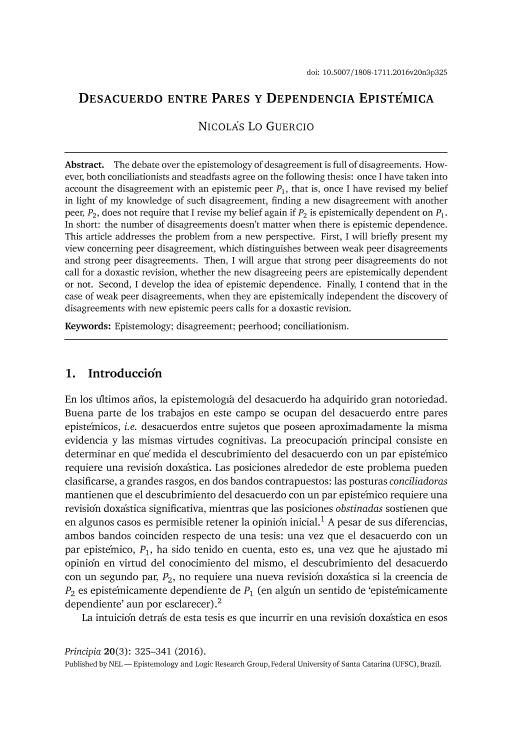Mostrar el registro sencillo del ítem
dc.contributor.author
Lo Guercio, Nicolás Francisco

dc.date.available
2018-07-25T19:26:40Z
dc.date.issued
2016-09
dc.identifier.citation
Lo Guercio, Nicolás Francisco; Desacuerdo entre Pares Epistémicos: El Número Importa; Universidad Federal de Santa Catarina. Departamento de Filosofía; Principia; 20; 3; 9-2016; 325-341
dc.identifier.issn
1414-4247
dc.identifier.uri
http://hdl.handle.net/11336/53127
dc.description.abstract
El debate en torno a la epistemología del desacuerdo está signadopor el desacuerdo entre conciliadores y obstinados. Sin embargo, ambosbandos coinciden acerca de la siguiente tesis: el desacuerdo con un parepistémico cuya creencia es epistémicamente dependiente de una instan-cia de desacuerdo que ya ha sido tenida en cuenta no requiere una nueva revisión doxástica. En otras palabras, cuando existe dependencia epistémi-ca, el número de desacuerdos no importa. En este artículo se examina la cuestión. En primer lugar se presenta una teoría general acerca de los desacuerdos reconocidos entre pares epistémicos, según la cual debemos distinguir entre desacuerdos fuertes y desacuerdos débiles. En segundo lugar, se argumenta que los desacuerdos fuertes no motivan en ningún casouna revisión doxástica, sin importar el número de discordantes involucra-dos, ni si sus creencias son o no epistémicamente dependientes. En tercer lugar, se desarrolla una noción de dependencia epistémica. Finalmente se argumenta, en relación con los desacuerdos débiles, que ante el descubri-miento de un nuevo desacuerdo, si este es completamente independiente de otros desacuerdos ya tenidos en cuenta, es necesaria una nueva revisión doxástica.
dc.description.abstract
The debate over the epistemology of desagreement is full of disagreements. However, both conciliationists and steadfasts agree on the following thesis: once I have taken into account the disagreement with an epistemic peer P1, that is, once I have revised my belief in light of my knowledge of such disagreement, finding a new disagreement with another peer, P2, does not require that I revise my belief again if P2 is epistemically dependent on P1. In short: the number of disagreements doesn't matter when there is epistemic dependence. This article addresses the problem from a new perspective. First, I will briefly present my view concerning peer disagreement, which distinguishes between weak peer disagreements and strong peer disagreements. Then, I will argue that strong peer disagreements do not call for a doxastic revision, whether the new disagreeing peers are epistemically dependent or not. Second, I develop the idea of epistemic dependence. Finally, I contend that in the case of weak peer disagreements, when they are epistemically independent the discovery of disagreements with new epistemic peers calls for a doxastic revision.
dc.format
application/pdf
dc.language.iso
spa
dc.publisher
Universidad Federal de Santa Catarina. Departamento de Filosofía
dc.rights
info:eu-repo/semantics/openAccess
dc.rights.uri
https://creativecommons.org/licenses/by-nc-sa/2.5/ar/
dc.subject
Epistemología
dc.subject
Desacuerdo
dc.subject
Paridad
dc.subject
Conciliacionismo
dc.subject.classification
Estudios Religiosos

dc.subject.classification
Filosofía, Ética y Religión

dc.subject.classification
HUMANIDADES

dc.title
Desacuerdo entre Pares Epistémicos: El Número Importa
dc.title
Disagreement between epistemic peers and epistemic dependence
dc.type
info:eu-repo/semantics/article
dc.type
info:ar-repo/semantics/artículo
dc.type
info:eu-repo/semantics/publishedVersion
dc.date.updated
2018-07-25T13:55:26Z
dc.identifier.eissn
1808-1711
dc.journal.volume
20
dc.journal.number
3
dc.journal.pagination
325-341
dc.journal.pais
Brasil

dc.journal.ciudad
Florianópolis
dc.description.fil
Fil: Lo Guercio, Nicolás Francisco. Consejo Nacional de Investigaciones Científicas y Técnicas. Universidad de Buenos Aires; Argentina
dc.journal.title
Principia

dc.relation.alternativeid
info:eu-repo/semantics/altIdentifier/doi/http://dx.doi.org/10.5007/1808-1711.2016v20n3p325
dc.relation.alternativeid
info:eu-repo/semantics/altIdentifier/url/https://periodicos.ufsc.br/index.php/principia/article/view/44557
Archivos asociados
